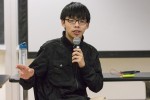The original version of this article contained an error and has been changed. See the bottom of the article for more information.
A student activist who led a pro-democracy protest in Hong Kong last year called for more civil disobedience in the city and for support from UCLA students at a discussion Sunday on campus.
STAMP China Forum, a student-run group that aims to discuss Chinese issues, hosted Joshua Wong because he led the Umbrella Movement protests in Hong Kong during the later months of 2014. As part of the movement, protesters occupied main streets in the city and demanded genuine democracy and a direct election.
Wong, who came to the U.S. for the first time last weekend to rally and gain support for the movement, also gave guest lectures at a few UCLA classes last week.
The protests focused on democratizing the nomination process for chief executives, in which the central Chinese government preselects the candidates.
Many protesters view this as a violation of the “Basic Law,” which entitles Hong Kong to universal suffrage.
Wong said at the discussion that he has has high hopes for the future of Hong Kong, despite the government clearing the occupation in mid-December. Since then, smaller protests have occasionally popped up in the city.
“I feel quite optimistic … especially (because) students interested in politics (are showing) concern for the future,” Wong said.
Wong said leaders of the movement plan to continue calling for the direct election of the city’s representatives through civil disobedience.
The day after the discussion, Wong participated in a UCLA International Institute panel with Au Loong Yu, an activist in Hong Kong, and Jieh-min Wu, a professor from Taiwan. Wu said he thinks the protesters in the Umbrella Movement continue to have hope for a democracy and said he thinks the movement has been successful.
“It is a long process, so people get disappointed. … They didn’t get what they wanted directly from the hands of the regime,” Wu said. “However, the message to the world is that the Hong Kong civil society wants to have a voice in the decision-making of their future.”
Students who attended the panel Sunday said they learned about Wong and the protest, though some expressed skepticism about the future of the movement.
Nicholas Leung, president of the UCLA Hong Kong Student Society and a fourth-year business economics student, said he thinks the movement has lost its original spirits.
“It seems focus is being shifted to other things. I do expect (the Chinese government) will vote on whether to pass the proposal, and there will be more voice and action at that point. I really want (the movement) to have more involvement from the government and students,” Leung said.
Elkana Chan, a first-year applied mathematics student, said she had an interest in Chinese politics as a child when her mother would share the Hong Kong news with her. Though she wishes the best for Hong Kong, she said she thinks democracy is out of reach for the next few years.
“As much as I hope for democracy for Hong Kong, I don’t think it will happen in the near future,” she said. “It’s really difficult for democracy to be achieved when Hong Kong is not a sovereign state and the people of Hong Kong still have mixed ideas about their identity.”
Kiki Lin, a third-year psychology and economics student, disagreed with Chan and Leung and said she is optimistic about the future of the Umbrella Movement.
“There is democracy in the U.S., why not in Hong Kong? What Joshua Wong does opens up a bright future for Hong Kong,” Lin said.
The next election will be held in Hong Kong in 2017.
Correction: Elkana Chan said Hong Kong is not a sovereign state. She did not say it was a sovereign state.
